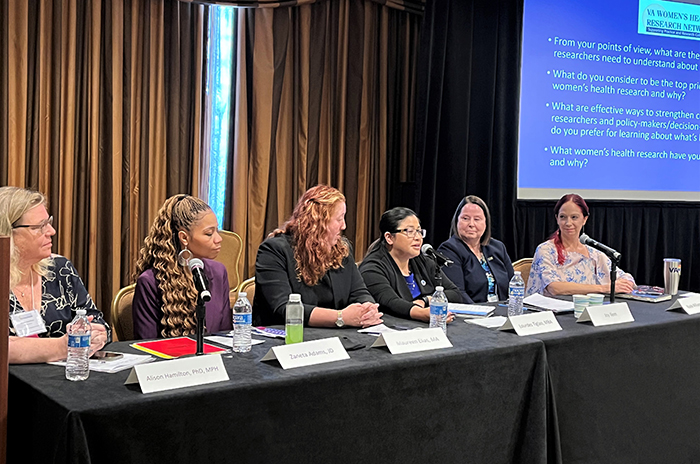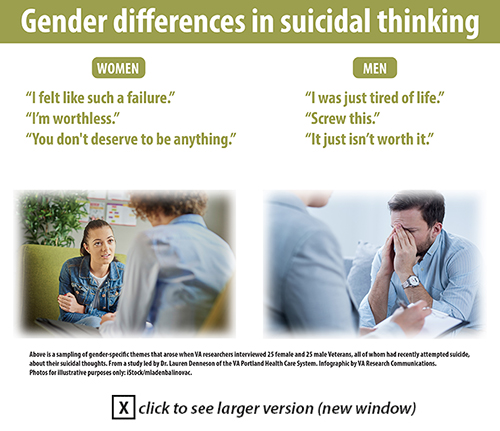Office of Research & Development |
 |
Office of Research & Development |
 |


A new VA study finds that men and women are harboring different thoughts in the moments before they decide to die by suicide. “Women feel personally like they are not worth anything, and men feel like the world has sort of let them down,” says the lead author, Dr. Lauren Denneson. (Photo for illustrative purposes only: ©iStock/tommaso79)
September 17, 2020
By Mike Richman
VA Research Communications
"I was surprised by how clearly different some of the experiences were by gender."
A new study finds that a much different set of emotions may have driven male and female Veterans to attempt suicide.
The findings appeared online in the journal Social Science & Medicine in September 2020.
In interviews with the researchers, 25 male Veterans and 25 female Veterans who had made a recent suicide attempt discussed their suicidal thoughts. In the moments before they tried taking their lives, the women recalled feeling “shameful,” “tainted,” and “worthless.” The men talked about feeling overwhelmed and remembered thinking, “it just wasn't worth it,” “I've had enough,” and “screw this.”
The researchers also found that experiences related to self-concept, power, relationships, coping, and stress were key contributors to the Veterans’ suicide attempts. These experiences often differed by gender.

VA Researcher Named One of U.S.’ Top Female Scientists

2023 VA Women's Health Research Conference

Self-harm is underrecognized in Gulf War Veterans
Dr. Lauren Denneson, a specialist in social psychology and public health at the VA Portland Health Care System, led the study.
“Our findings suggest that women and men have very different precipitating thoughts when they decide to take their own lives,” she says. “Women feel personally like they are not worth anything, and men feel like the world has sort of let them down.”
Denneson pursued the study largely because of the growing suicide rate among female Veterans and because suicide prevention research has been based mostly on men. She also felt it important to gain a better understanding of suicide risk based on the experiences of Veterans with recent suicide attempts. The results were not exactly what she expected.
“I was keeping a very open mind about whether we might see gender differences and what those differences might be,” she says. “I was surprised by how clearly different some of the experiences were by gender.”
Denneson thinks the findings may provide clinicians with a better understanding of women Veterans who are at risk for suicide and how their treatment needs may differ from those of men. That means, for example, clinicians may take a different approach when using a psychotherapy like cognitive behavioral therapy (CBT), especially with treatment goals or suggested homework, she says. CBT, which is often used in VA, aims to change negative patterns of thinking or behavior that underlie people's difficulties, and to improve the way they feel by challenging unhelpful thinking patterns.
“We saw how much the traumatic experiences women had in relationships, for example, through intimate partner violence and military sexual trauma, and the perceived rejection by others, played a role in their sense of worth,” Denneson says. “Given that, it seems important to increase women’s sense of self-worth to reduce their risk of suicide. But perhaps, it would be most impactful if this occurred in the context of positive relationships.
“For the men, we saw how frustrated they were with the many challenges and setbacks they experienced,” she adds. “At the same time, they talked about life being pointless and not worth the struggle. So it seemed that a clearer sense of purpose might make the struggle seem more ‘worth it,’ and having successful experiences may get them closer to feeling like they’re living the life they want to live, or at least that they have the ability to get there.”

Suicide prevention is VA’s top clinical priority. The agency says an average of 17 Veterans are dying by suicide every day. VA’s 2019 National Veteran Suicide Prevention Annual Report notes that in 2017—the most recent year for which data are available—the suicide rate for Veterans was 1.5 times the rate for non-Veterans, after adjusting for population differences in age and sex, and 2.2 times the rate for female Veterans compared to non-Veteran women.
Plus, the suicide rate among women Veterans rose 61% between 2005 and 2017, compared with 43% for men, according to the VA report.
The 50 Veterans in Denneson’s study averaged 45 in age, and more than 50% were white. Their military service history spanned from the Vietnam War to the post-9-11 conflicts in Iraq and Afghanistan.
Many of the participants had been diagnosed with mental health conditions, most notably anxiety, depression, personality disorders, PTSD, substance use disorders, or schizophrenia-bipolar disorder. Schizophrenia and bipolar disorder both affect how people think and act, and some of the symptoms are similar. Bipolar disorder can cause huge mood swings, while schizophrenia involves a breakdown in the relation between thought, emotion, and behavior, leading, in part, to a withdrawal from reality.
Large percentages of the sample also had a sleep disorder diagnosis or chronic pain.
In terms of the questions, “We asked the participants what led them to start thinking about suicide and why they decided to try to take their own life,” Denneson says. “We also asked what had changed in their lives since their most recent attempt. We tried to get at strengths and resources, as well, by asking what has helped them or what would help them overcome or handle the challenges they described.”
When the Veterans were asked about the circumstances that preceded their suicide attempt, some themes emerged that were common across the genders. There were also patterns unique to each group.
According to the researchers, the men and women both discussed negative experiences, such as failed or failing relationships, feeling betrayed by others, lacking a sense of purpose, financial problems, health symptoms, or feeling overwhelmed. “Although such concerns contributed to their motivations for suicide, the thoughts participants had just before deciding to attempt suicide centered more on their evaluations of self and their existence in the world,” the researchers write.
The research team found that feeling worthless or shameful was the most prominent theme and precipitating thought to the suicide attempts among the female Veterans. “Women internalized feelings of powerlessness and poor relationships with others, and they experienced disruptions to their sense of self, coping resources, and perceived control over their environment,” the researchers write. “They reported feeling like `a throw away,’ often a reflection of how they believed others viewed them.”
A few of their responses are as such:
Some of the women also discussed being the victim of military sexual trauma and how that experience affected them mentally. Research has shown that military sexual trauma is linked to suicide risk, even when controlling for co-occurring mental health conditions.
“Being sexually assaulted [in the military], it made me feel super vulnerable and weak,” one woman said. “In the beginning, I told you I wanted to become a Marine for the discipline and the strength and all those things. So the last thing I would ever want to feel was that I was weak or someone could make me do something that I didn't want to do. It happened, so I deal with reminding myself that I'm not weak, but I feel weak.”
Among the men, feeling like they have nothing left to live for emerged as the most common thought in the moments before their suicide attempts, according to the research team. “Men experienced multiple stressors and felt unable to achieve the level of success they thought they should, while believing they were not contributing anything important to the world and perhaps letting their loved ones down,” the researchers write. “Without feeling a clear sense of purpose in their lives, many felt that this struggle was not worth it anymore. Often, this was an abrupt thought, mixed with anger and frustration.”
Some of the male responses included:
Denneson and her team believe the study offers an “in-depth, nuanced understanding” of the gender differences in suicide risk among Veterans. The researchers think female Veterans may benefit from methods to increase self-worth through positive social relationships, while male Veterans may benefit from methods that increase their sense of purpose in life and that help them achieve their ideal selves through successful experiences.
“Importantly,” the researchers write, “this study provides a strong basis on which to build additional, quantitative research on gender differences in suicide risk–grounded in the experiences of a national sample of Veterans who are at risk for suicide.”
Currently, Denneson and her colleagues are fielding a national, long-term survey of Veterans with a recent suicide attempt. “The survey is designed to help us better understand the factors we previously identified that contributed to the Veterans’ suicide attempts,” she says. “This should help in informing treatment recommendations.”
VA Research Currents archives || Sign up for VA Research updates